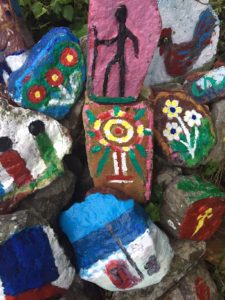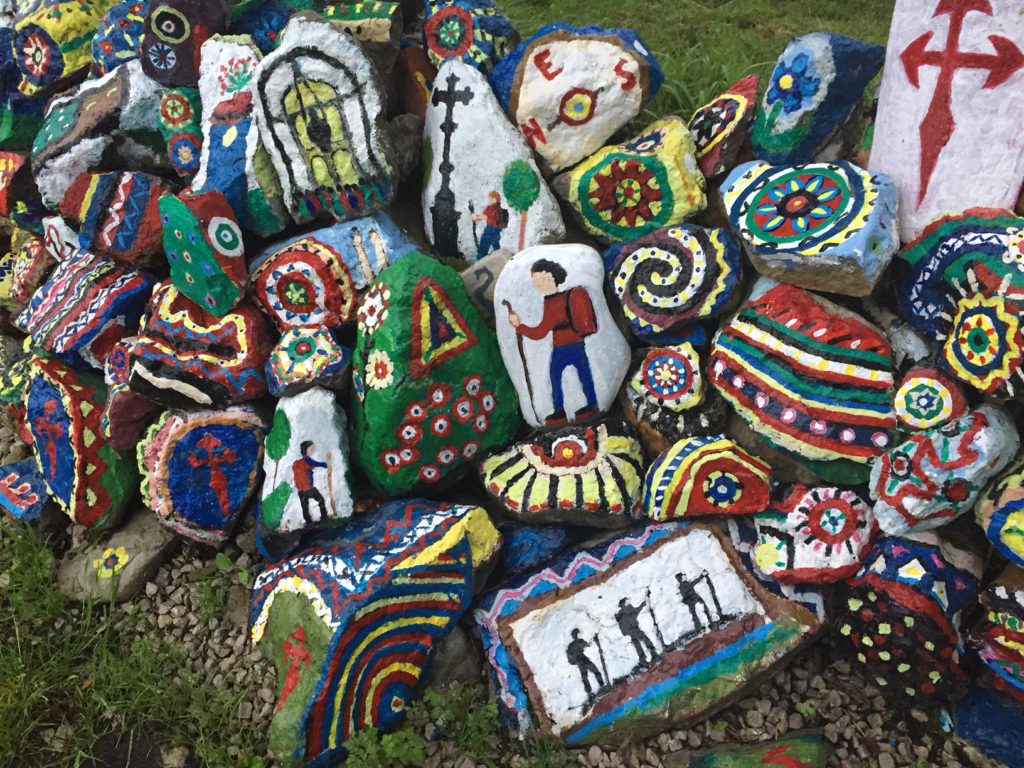Feast of Saint James
the tolling of the bells
high to low
high to low
as I look across
green hills
sheep in pastures
houses in the valley
sweet with fruit trees
the wooly white of plaster
red tile roofs like apples
dropped on long stone walls
high to low
high to low
as I look across
great mountains
looming from mists
towering into cloud and time
paths I cannot quite see
but want to find
a space to breathe
in hillside rain
high to low
high to low
the tolling of the bells
as I look across
As I left Piñeres and the stunning view of misty mountains, I came upon the painted stones.
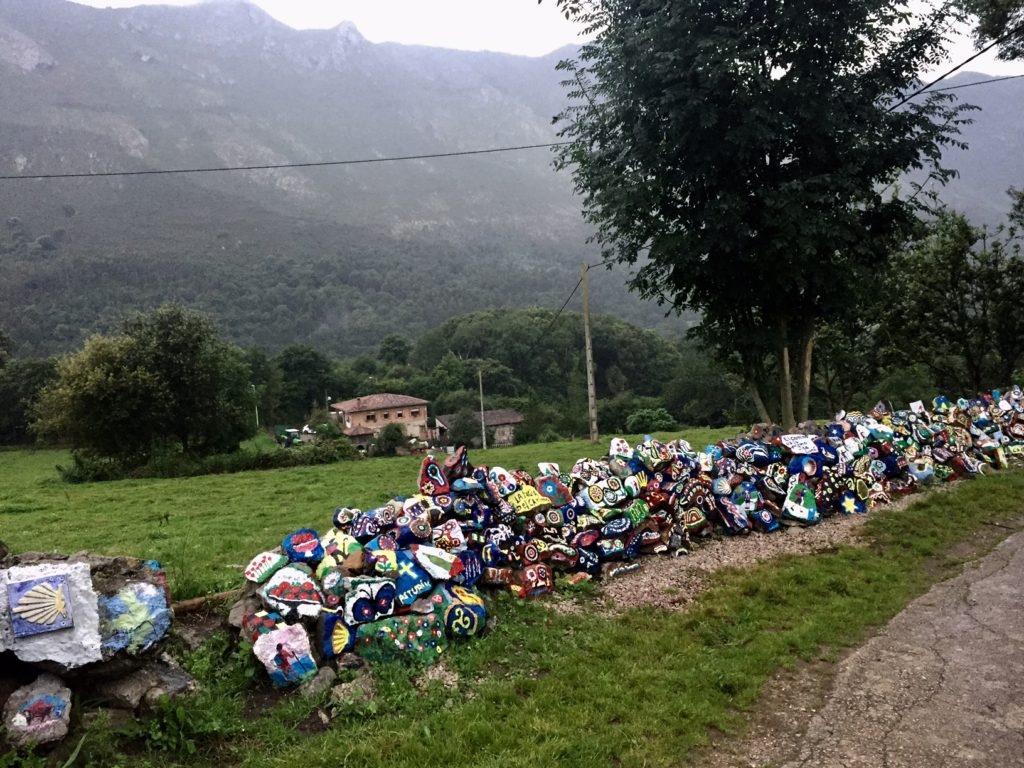 What a wonder. I suspected they were painted by the same artist whose folk images were framed on every floor of the rectory, my favorite a group of chickens, reminding me of the Chicken Fiesta.
What a wonder. I suspected they were painted by the same artist whose folk images were framed on every floor of the rectory, my favorite a group of chickens, reminding me of the Chicken Fiesta.
These rocks were painted with images and symbols of Astorias and the Camino, phrases like “Camino Magic” sprinkled throughout. Even after the fiesta of colorful stones ended, here and there I found a star, then another, yellow, painted randomly on rocks within the stone wall along the path.
Finally, a sign: Camino de Estrellas. So I had traced the Camino of Stars, quite fitting after the rainbow arching from the rectory to the mountains yesterday evening. Following these heavenly signs, I walked into the The Feast Day of Saint James.
According to the stories, James was an ordinary guy, a fisherman with his brother. As Jesus was walking his path, doing his Galilee camino, and passing the place where they were fishing, he apparently worked a miracle, so that as they pulled up their nets, the nets overflowed with a catch so heavy the fish wriggled and flipped in enormous heaping mounds in their boats.
And just like that, James was hooked by Camino Magic.
He became one of Jesus’ apostles, and after Jesus’ death, he reportedly traveled to Spain, teaching and preaching the truth as he had come to believe, a truth of transformation. A gently rebellious belief in the power of one life connected to the sacred. As if it might matter. As if this sort of connection might save our lives.
Foolishly returning to the scene of these crimes of transcendence, he was of course killed; beheaded without mercy, by Herod, while in Jerusalem. Yet now, the Camino Magic picked up where Herod left off. Give it to La Virgen de la Barca or simply to James’ only known followers, Athanacio and Teodoro, somebody is believed to have retrieved his body and brought it all the way back to Spain, across the sea, burying him in an unmarked grave in an open field. Time passed: centuries.
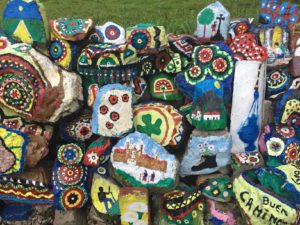 Nearly 800 years later, a hermit, a peasant, a man of no standing, an ordinary guy, had a vision. His name was Pelayo. He saw a star shining brilliantly on one spot on the campo, the grassy fields, and he believed this had a deep and powerful meaning, a connection to the sacred. As if it might matter. So he found the local bishop, and took him to the exact spot, and where the star had shone so brightly – they uncovered buried bones.
Nearly 800 years later, a hermit, a peasant, a man of no standing, an ordinary guy, had a vision. His name was Pelayo. He saw a star shining brilliantly on one spot on the campo, the grassy fields, and he believed this had a deep and powerful meaning, a connection to the sacred. As if it might matter. So he found the local bishop, and took him to the exact spot, and where the star had shone so brightly – they uncovered buried bones.
The bishop declared them the lost bones of Saint James, Santiago. He became Santiago de Compostela, Saint James of the Star Field, as did his tomb, within his chapel, which became his cathedral, within his majestic city, on his camino, which extended across all of Europe. Three major pilgrimage destinations arose for early Christians: Rome, Jerusalem, and Santiago de Compostela.
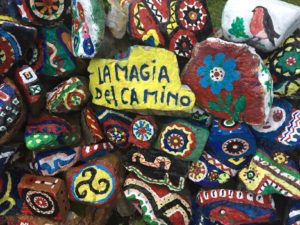 Herod’s fear and intolerance were defeated by Camino Magic. By the Camino of Stars, which led from a star shining over Jesus’ storied birth in a stable, to a star shining over James’ bones in a pasture. Nobody important, these two ordinary guys, Jesus and James.
Herod’s fear and intolerance were defeated by Camino Magic. By the Camino of Stars, which led from a star shining over Jesus’ storied birth in a stable, to a star shining over James’ bones in a pasture. Nobody important, these two ordinary guys, Jesus and James.
Nobody important, either, this guy Pelayo, whose name means, “of the sea.”
* * * * * * * * * * * * * * * * *
Walking in the light rain yesterday, I found myself turning over the puzzle of my mother like a Rubik’s cube in my hands. What to do with her, what to do. Finally, I asked out loud into the rain, “What happened to you? Where did you come from?”
I know, and yet I do not know. I hiked along, examining her story from all sides. I wondered how she felt when she was seven years old and her mother had a stroke. Did anyone explain it? She must have been very scared, and very sad, and, I would bet, very alone, from what I had seen of her family. Over the next ten years of her young life, she watched her mother slowly deteriorate, stroke upon stroke, upon stroke. Until the one that finally ended her life. When my mother was only seventeen.
Seventeen-year-old me remained quiet. I looked at them both, trying to place them side by side. But while the image of my young self was feeling stronger and more real within me each day along the Camino, this image of my young mother shimmered and rippled, blurry in the mist.
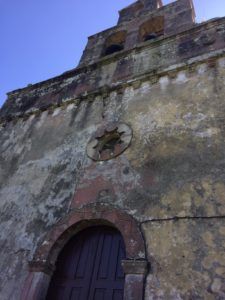 Passing a roadside shrine, I found a very young image of Mary with her Baby, like a teenager holding a child. Like my mother, who was not allowed to walk across the stage at her high school graduation, her seven-months-pregnant belly announcing that her baby would be born sooner than anyone found comfortable. She had met a very charming young man, flattering her with attention and promises. She had to be gasping for air, having just lost her mother after a decade of childhood agony, the pressures of graduation upon her, pinning her hopes on her application to the Art Institute of Chicago, where her graceful lines and deft touch could be transformed into a life of beauty.
Passing a roadside shrine, I found a very young image of Mary with her Baby, like a teenager holding a child. Like my mother, who was not allowed to walk across the stage at her high school graduation, her seven-months-pregnant belly announcing that her baby would be born sooner than anyone found comfortable. She had met a very charming young man, flattering her with attention and promises. She had to be gasping for air, having just lost her mother after a decade of childhood agony, the pressures of graduation upon her, pinning her hopes on her application to the Art Institute of Chicago, where her graceful lines and deft touch could be transformed into a life of beauty.
I wondered now if the waiting became too much; if it felt like centuries passing overhead, while your heart remained buried, unmarked. Unknown. I have never known if she was accepted to the Art Institute. I only know that she gave birth to my brother, and married the charming abuser, and struggled in menial typing jobs, night jobs, watching her earnings blown like dry leaves on alcohol and partying with drinking buddies, on make up to disguise bruises. I know she scrimped to save a few hundred dollars to hire a divorce lawyer. I know she felt a rageful triumph in serving the papers to his unsuspecting, blinking, stammering face. I know she and my brother ate dry corn flakes without milk and survived on her night jobs, with family and acquaintances babysitting.
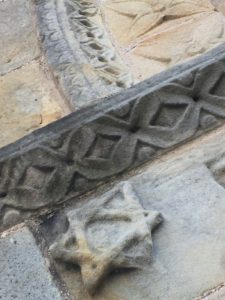 And I know when she met my father, he was married, but unhappy; handsome and charming, but safe; a man in uniform, a former Marine now in law enforcement. I know she worked for him as a secretary. I know he saw her and thought she was stunningly beautiful. I know he gave her a ride, helping her pick up her little boy after work, and I know she intentionally left the tiny rainboots in the back of his cruiser.
And I know when she met my father, he was married, but unhappy; handsome and charming, but safe; a man in uniform, a former Marine now in law enforcement. I know she worked for him as a secretary. I know he saw her and thought she was stunningly beautiful. I know he gave her a ride, helping her pick up her little boy after work, and I know she intentionally left the tiny rainboots in the back of his cruiser.
We talked before his death, years ago, my father and I. I know he saw her as his salvation, his ticket out…the same way she saw him. He lost everything when he chose her – his family, his career, respect, trust. I know this proud man was mocked for following his heart. And I know that, though he wanted to be a man of peace, he was a man of passion.
He loved her to the end, to his very last day. And I could never understand it. I hadn’t known her then. I never met that young woman. Except, I did. I just didn’t remember meeting her.
He left everything behind for her, seven months pregnant – this time, with me. I would be the only baby whose birth he remembered like a photo framed in his memory. I would be the child he asked to help him as he was dying, to preserve his dignity and pride. I was nobody; I was child #8 of 10, the child who crushed my mother’s hope to give him a son. It was the worst task he could have given me. It was the most significant and beautiful task of my life. And she was the link between us. She gave me this father, who was safe, and strong, and devoted to a woman who wielded the pain of her childhood like a sword, trying to behead a hydra she could not defeat. Beheading the child instead, armored in a scream she never voiced, this motherless child become childless mother.
Maybe it is that She Who Hears the Cries of the World cannot hear what cannot be uttered. Or maybe we cannot see our one true believer, the ordinary guy who saw us at the window and thought the light shone from within us. I think it more likely that we cannot ask for mercy, nor offer it, if we have no concept that it might exist in the world.
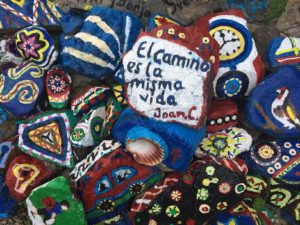 Seventeen-year-old me recited some Shakespeare from British Lit class as we made our way along the muddy path together:
Seventeen-year-old me recited some Shakespeare from British Lit class as we made our way along the muddy path together:
“The quality of mercy is not strained;
it droppeth as the gentle rain from heaven
upon the place beneath. It is twice blest;
it blesseth him that gives and him that takes….”
* * * * * * * * * * * * * * * * *
At the albergue, we were all surprised and touched when the nearby community came together and prepared mounds of food just for us, los peregrinos, for The Feast of Saint James. In the sloping backyard, on long tables pulled into the grass, arrived platters of pinxchos, serrano ham and sausages, egg and potato tortilla, baskets of bread, wine, beer, local cider, and oh, my beloved bizcocho.
I had been talking about this day for weeks – but never expecting an actual feast. I had thought I would celebrate quietly, mindfully perhaps, perhaps with others if they wished.
But the locals were having none of that. Laughing, singing, they would lift trays of food and carry them to us, urging us to eat more, drink more, handing food down to us from above, creating a community celebration as we sat in the grassy field, all together. It was like Christmas in July. Like Dios de Los Muertos in Colorado, where you picnic on the graves of those you love, with those you love. Only here, those we loved were those we did not know. Except, we did.
Surrounded and served by the kindness of strangers, we toasted each other. God rest ye merry.
